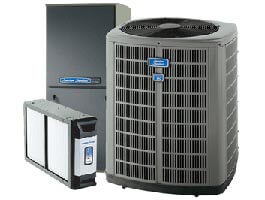New Central Air Conditioning Units Can Save Energy
As many as eighty percent of the new homes being built in the U.S. are built with central air conditioning units installed. Central air just makes sense, as it keeps the indoor temperatures comfortable while filtering and dehumidifying the air. This is particularly nice for people who suffer from allergies or asthma. Fortunately, central air conditioning units can be installed in preexisting homes, too.
Choosing The Right Size
When shopping around for central air conditioning units, there are several things to consider. One is the size of the home you will be cooling. Air conditioning units come in different sizes, so it is important to choose the most efficient size for the cooling job you have in mind. If the unit is too large, it won’t dehumidify properly. To determine the right size, consult an HVAC contractor. They should have access to a calculation method that can help you choose a size.
SEER Rating
Another important consideration in central air conditioning units is an efficiency measure called the SEER rating. These letters stand for Seasonal Energy Efficiency Ratio. New air conditioners are required to have a rating of 13. A unit that was installed over twenty years ago probably has a rating of only 7 or 8. This is because technology has improved the energy efficiency.
By replacing old inefficient air conditioners with new central air conditioning units, you can save a lot of money in cooling costs. It is estimated that increasing the SEER rating from 11.5 to 13 could save you over $500 each year in cooling costs. Also, look for “Scroll(tm) technology” when choosing a compressor for the latest in efficiency.
Look For Energy Star
Another thing to look for in central air conditioning units is the “Energy Star.” This is a certification given to new appliances that use less energy than other new models. Of course, they use a lot less than equivalent units that are a number of years old.
Put Your Air Conditioning Unit In A Good Location
When installing central air conditioning units, the location of the outdoor unit can make a big difference. If it is surrounded by vegetation or is under a deck, the air will not be able to flow freely in and out of it. Not only that, the units can be noisy. Don’t install it near an area where you like to enjoy eating or visiting outdoors, such as a patio or deck.



Call